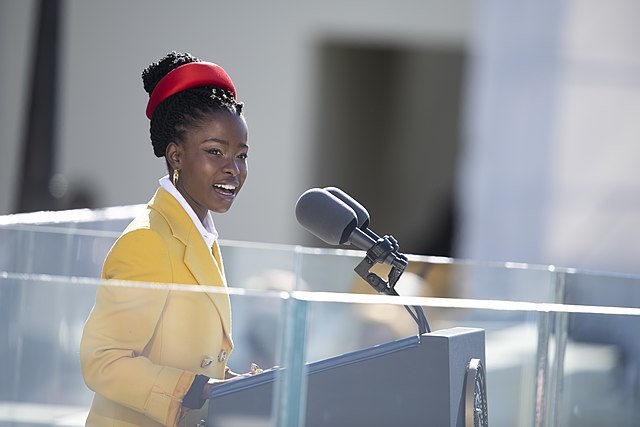
President Joe Biden’s inauguration was a day of celebration for many Americans — a sign of hope, indicating a better tomorrow for the nation.
A large part of those promises shined through “The Hill We Climb,” Amanda Gorman’s soul-moving poem she delivered on January 20, 2021, making her the youngest inaugural poet in U.S. history.
To top it off? Gorman, then just 22 years old, is a beautiful dark-skinned Black woman. She stood tall, loud, and proud as she addressed the entire country with grace and poise a mere two weeks after the Jan. 6 insurrection.
Well, unfortunately, many others want to silence Gorman’s voice. According to a parent in Florida, Gorman’s poem doesn’t represent hope and faith in this country, but rather “indirect hate messages.”
Miami-Dade County Schools responded by limiting access to Gorman’s, “The Hill We Climb,” in elementary schools after a single parent from Bob Graham Education Center, a pre-kindergarten through eighth-grade school in Miami Lakes, filed a written complaint. The poem was one of five books challenged by a parent at the school, including “The ABCs of Black History.”
Daily Salinas, the parent responsible for the complaint, referenced two pages of the book in defense of the “hate messages” she felt were being taught.
“We’ve braved the belly of the beast. We’ve learned that quiet isn’t always peace, And the norms and notions of what ‘just is’ Isn’t always justice.”
And
“And yet the dawn is ours before we knew it.
Somehow, we do it. Somehow, we’ve weathered and witnessed. A nation that isn’t broken, but simply unfinished.”
Gorman, now 25, took to Instagram to address the outrageous ban.
“Often all it takes to remove these works from our libraries and schools is a single objection,” she wrote. “And let’s be clear: most of the forbidden works are by authors who have struggled for generations to get on bookshelves,” she continued.
In addition to saying Gorman’s book has no educational value and contains indirect hate messages, the parent mistook the author for Oprah Winfrey, who wrote the foreword. No wonder Black people often joke that non-Black people think we all look alike.
Social media users instantly took their frustrations to Twitter and Instagram, speaking out in defense of Gorman’s poem and the rights of students to literary freedom.
“This is a betrayal of the very values we should be imparting to our youngest Americans,” Stacey Abrams, former Georgia state representative, wrote. “How to be curious, to inquire, and to reach beyond our boundaries. Thank you, @theamandagorman for speaking up. And gratitude to @PENamerica & @FLFreedomRead for holding the line. #EndBookBans.”
This ban is another example of the power and privilege one white or anti-Black voice can have over an entire district. In March, one parent prompted the removal of the Disney Ruby Bridges film in Pinellas County Schools in Florida.
Advocacy groups like the NAACP have also issued travel advisories for Florida “in direct response to Governor Ron DeSantis’ aggressive attempts to erase Black history and to restrict diversity, equity, and inclusion programs in Florida schools.”
Under DeSantis, Florida has banned the teachings of Critical Race Theory, college-level instruction which acknowledges systematic racism as part of American history and is crucial to understanding the full scope of Black people’s experience in this country. DeSantis also blocked the new AP African American Studies course and has signed legislation that defunds diversity programs at Florida’s public colleges and universities.
But Gorman’s poem has had a positive impact on students.
Gorman wrote in her Instagram statement that ever since delivering the poem and publishing it as a book, “I’ve received countless letters and videos from children inspired by The Hill We Climb to write their own poems. Robbing children of the chance to find their voices in literature is a violation of their right to free thought and free speech.”
To that end, Gorman also invited supporters to donate to the writer’s group PEN America, which she said had joined her publisher, Penguin Random House, to issue a lawsuit challenging book restrictions in Florida. According to PEN, 565 books were banned in Florida for the 2021-22 school year.
Miami-Dade Mayor Daniella Levine Cavaas issued a statement on May 22 about the ban. “We stand against any efforts to undermine our strengths and our shared prosperity,” she wrote.
And as Gorman wrote on Instagram, “Together this is a hill we won’t just climb, but will conquer together.”



